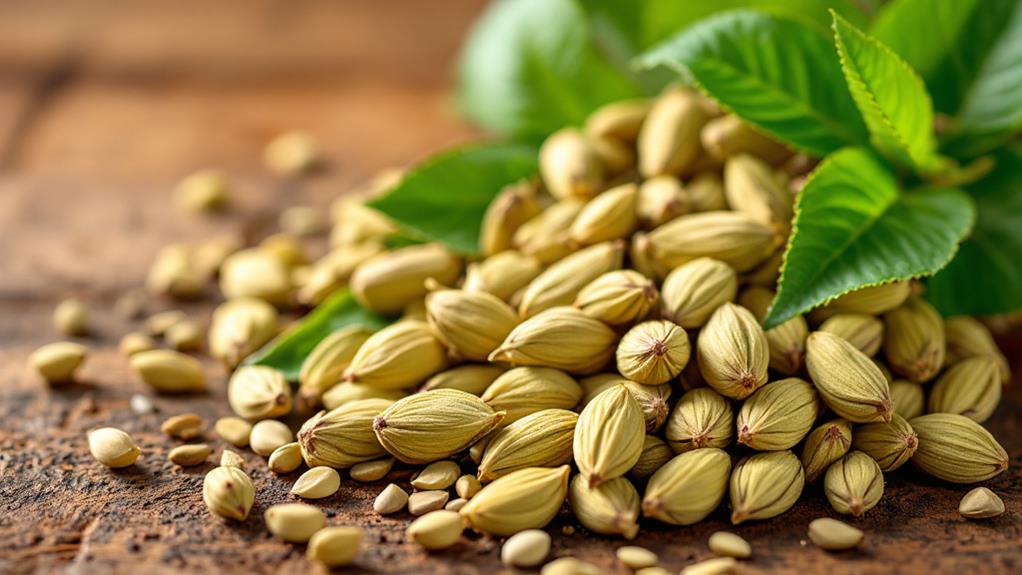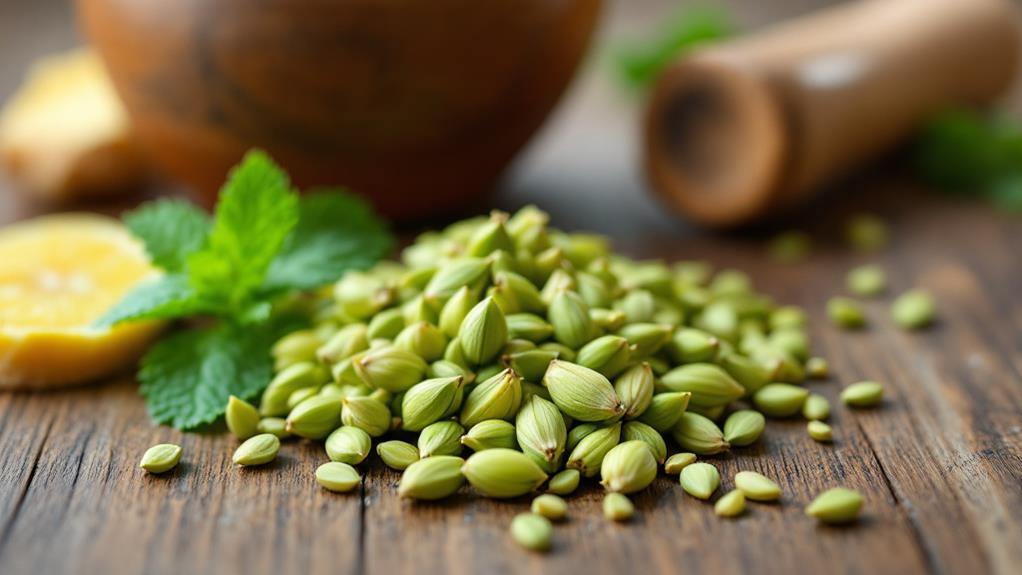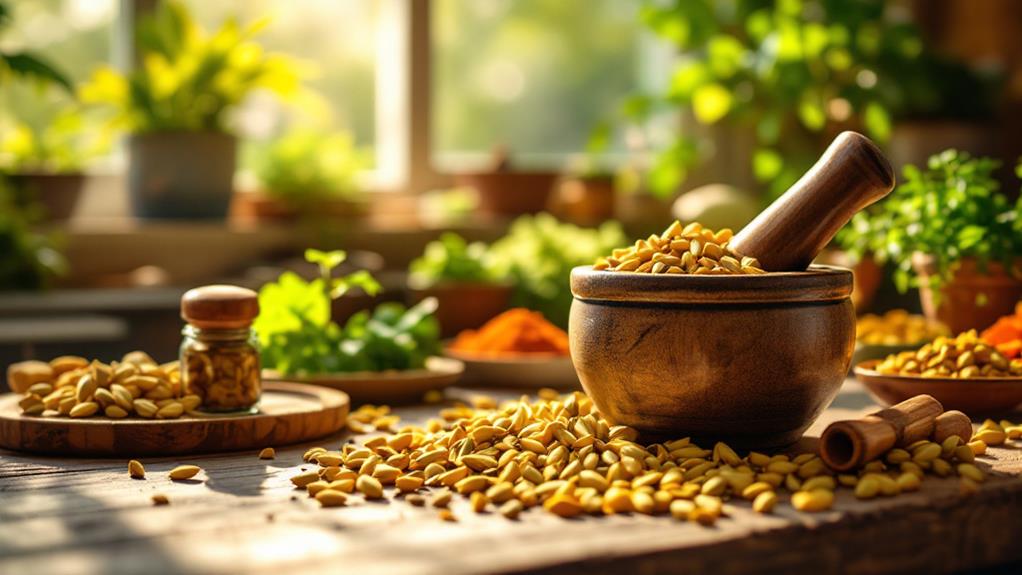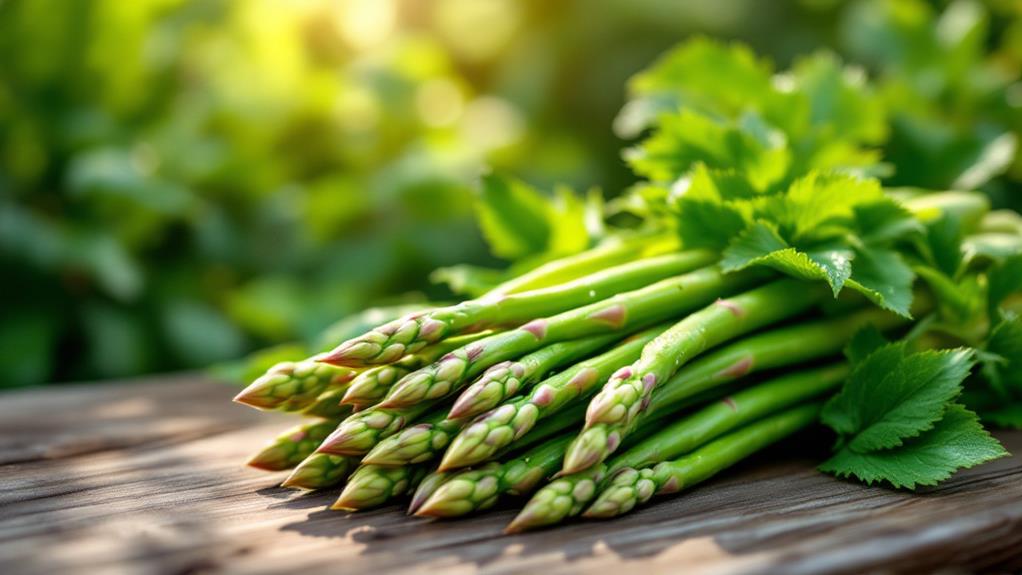The Health Benefits of Cardamom: A Spice for Better Health

You might find it surprising that cardamom isn't just a flavorful spice; it's packed with health benefits. Including it in your diet can notably lower blood pressure and enhance heart health by increasing antioxidants and improving insulin management. Its anti-inflammatory properties help reduce the risk of chronic diseases and benefit your digestive system by alleviating symptoms and protecting against ulcers. Cardamom also supports oral health, freshens breath, and promotes respiratory ease. Plus, its antioxidants protect your brain health, enhancing cognitive functions. Curious to learn about its extensive advantages? There's even more to uncover about this versatile spice.
Blood Pressure and Heart Health
Many people might not realize that cardamom, a popular spice, can have noteworthy benefits for blood pressure and heart health. If you're dealing with hypertension, incorporating cardamom into your diet could be a game-changer. Research has shown that consuming just 3 grams of cardamom daily for 12 weeks can considerably reduce blood pressure levels. This is great news for those looking to manage their blood pressure naturally.
Cardamom doesn't just stop at lowering blood pressure; it's also a powerhouse for your cardiovascular system. The spice enhances antioxidant levels by 90%, offering protection against heart disease. By improving your body's antioxidant capacity, cardamom helps shield your heart from oxidative stress, which is a leading cause of cardiovascular problems.
Additionally, cardamom aids in insulin management, which is essential for comprehensive metabolic health. Better insulin management means a reduced risk of developing heart disease. The spice's anti-inflammatory properties also play an important role in maintaining heart health by potentially lowering the risk of heart attacks and strokes. Including cardamom in your diet could be a simple yet effective step towards improving your heart and blood pressure health.
Anti-Inflammatory and Antioxidant Effects
Some studies suggest that cardamom is packed with anti-inflammatory compounds that could help reduce inflammation tied to chronic diseases. This tiny spice, renowned for its health benefits, houses compounds that may inhibit inflammatory markers, as seen in animal studies. When inflammation is kept in check, you're less likely to suffer from the adverse effects of chronic diseases.
But that's not all—cardamom is a powerhouse of antioxidants, too. These antioxidants can enhance your body's defenses against oxidative stress and cellular damage. Human studies have shown a significant 90% increase in antioxidant levels among those consuming 3 grams of cardamom daily for 12 weeks. This improvement in antioxidant status can contribute to better health outcomes, providing a protective effect against the ravages of time and disease.
Additionally, test-tube studies highlight cardamom's potential role in halting the proliferation of cancer cells, further showcasing its capacity to combat oxidative stress. Though more human studies are needed, the evidence so far is promising. By incorporating cardamom into your diet, you're tapping into its anti-inflammatory and antioxidant properties, which could pave the way for improved health and resilience against chronic ailments.
Digestive and Oral Health

Cardamom, a spice with a rich history in traditional medicine, plays a significant role in digestive and oral health. If you're looking to improve your digestive health, cardamom might be just what you need. Studies reveal that it can reduce gastric ulcer size by at least 50% and protect against Helicobacter pylori, a key culprit in many gastrointestinal issues. Cardamom's powerful antioxidant properties help scavenge free radicals, reducing oxidative stress in your gastrointestinal tract. This contributes to a better gut environment, promoting general digestive wellness. Moreover, its anti-inflammatory properties can alleviate symptoms of digestive disorders, helping your body maintain a healthier balance.
When it comes to oral health, cardamom doesn't disappoint. Chewing its seeds can freshen your breath and aid in preventing cavities, thanks to its action against bacteria causing dental decay. Cardamom extracts inhibit bacterial growth associated with gum infections, promoting better oral hygiene. By incorporating cardamom into your routine, you're not just enhancing flavor but also investing in your health. Regardless of whether through chewing its seeds or enjoying it in your meals, cardamom supports both your digestive and oral health, making it a versatile ally in your wellness path.
Respiratory and Cognitive Benefits
Often overlooked, the respiratory and cognitive benefits of cardamom are gaining attention for their potential impact on general well-being. Inhaling cardamom oil can improve lung airflow and enhance breathing, making it a promising aid for respiratory health. Studies suggest that during physical activities, cardamom oil increases oxygen uptake, allowing you to breathe more efficiently. For those dealing with asthma, cardamom's anti-inflammatory effects might offer relief by supporting better respiratory function.
Cardamom doesn't just support your lungs; it also benefits your mind. Aromatherapy with this spice has been linked to reduced anxiety levels, which can improve your cognitive performance. By lowering anxiety, you might find it easier to concentrate and think clearly. Furthermore, cardamom's antioxidant properties may protect brain health, offering a shield against neurodegeneration. This means you could potentially maintain sharper cognitive functions as you grow older.
The combination of these effects makes cardamom a unique spice that not only improves your physical performance but also supports mental clarity. By incorporating cardamom into your routine, you could enjoy a multifaceted increase to both your respiratory and cognitive health.
Culinary Uses and Safety

A multitude of culinary applications makes cardamom a versatile spice, improving both sweet and savory dishes like curries, desserts, and chai coffee with its distinct flavor. This spice not only boosts taste but also contributes vital vitamins and minerals like Vitamin C, magnesium, and potassium to your meals. Plus, with just 6 calories per teaspoon, it's a nutritious addition to any diet. Cardamom comes in different forms such as whole pods, ground spice, and key oil, allowing you to choose the best fit for your cooking needs.
Here are some ways you can incorporate cardamom into your diet:
- Sweet Treats: Add ground cardamom to cookies, cakes, and pastries for a unique twist.
- Savory Dishes: Improve curries and rice dishes by infusing them with whole pods.
- Beverages: Create aromatic chai or spiced coffee by adding a pinch of cardamom powder.
When considering safety, cardamom is generally recognized as safe in typical food amounts. However, if you have gallstones, it's wise to moderate your intake. Before exploring cardamom supplements, especially if you're pregnant or breastfeeding, consult a healthcare provider to verify it's suitable for you.




